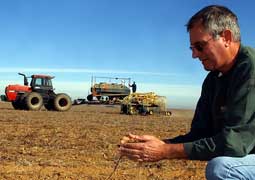
The Minister of Agriculture, Land Reform and Rural Development, Ms Thoko Didiza, has warned that the agricultural sector may suffer from severe drought conditions later this year. She issued this warning when she tabled her department’s Budget Vote in the National Assembly recently.
“Last year when we presented our Budget Vote we were addressing an unprecedented outbreak of locusts due to the good rains that we experienced in our country. Despite this challenge we were able to mitigate against the outbreak. We are ready for any outbreaks for the 2023 season.
“This year, a major challenge that could confront South Africa's agricultural sector in a few months is a change in weather conditions from favourable rains to drier and hot conditions. This would be a switch from a prolonged period of La Niña to El Niño,” the Minister warned. The Minister said scientists at the South African Weather Service and other global institutions see a potential occurrence of an El Niño later in the year, a probability of occurrence is over 60%. “Our department, supported by data from the South African Weather Services, will issue regular advisories to farmers to ensure that we manage this period,” she said.
She also had some good news when she announced that the agricultural sector grew by a cumulative 25% in real value-added, where approximately 55% of the value was generated from export earnings between 2020 and 2022. During the same period, the sector created about 50 000 new jobs, increasing the total number of people employed in the sector to 860 000.
“About 9% of agricultural output is produced by previously disadvantaged farmers, implying the sector is growing and gradually improving on inclusivity, this progress is encouraging but a far cry from our vision of a united and prosperous agricultural sector.”
She attributed the growth in agriculture to the enhancement of its competitiveness, made possible by clear policies, regulatory environment and financing instruments. The overall allocation for this financial year is R17 254 348 billion including transfers to provincial departments and entities of Agriculture as part of the Division of Revenue Act.
Participating in the debate, the Chairperson of the Portfolio Committee on Agriculture, Rural Development and Land Reform Inkosi Zwelivelile Mandela was concerned about the impact of load shedding and the risks that it holds for the agricultural sector, and called for a collective responsibility to continue seeking solutions and improving risk management.
Inkosi Mandela also spoke about the global market in hemp for creating bio char fertilisers, bio-fuels, textiles and building materials. “Last week we witnessed a world first with the announcement of the imminent opening of a 12-storey hotel made of hemp building materials, right here in Cape Town. This is an amazing contribution towards greater energy efficiency, reducing the carbon emissions footprint and the process of carbon sequestration that is driving a greater awareness of the realities of climate change.
“We eagerly await the approval of the Hemp Seed Development Scheme as well as greater clarity on how the department is capacitating subsistence and small holder producers to participate and fully benefit from all the master plans through the development of rural economies by enhancing production capacity, ensuring food security and creating employment,” Inkosi Mandela said.
The Democratic Alliance’s Mr Noko Masipa slammed the R500 million in blended finance for commercial farmers and labelled it as “nothing but a joke” to struggling farmers who are the breadbasket of southern Africa. “In 2021, the livestock industry generated the highest revenue in agriculture. However, the support for farmers has been lip service with one ministerial task team after the other providing no tangible outcome.
“Livestock farmers struggle to save their dying animals because of the failure of Onderstepoort Biological Product to produce vaccines. Farmers have been abandoned by the ANC government, the industry is facing a cost-price squeeze phenomenon where farmers are finding that their input costs paid do not translate into charging higher prices to recoup their expenses. It’s a fact that farmers are battling to service their debts,” said Mr Masipa.
Mr Nthako Matiase of the Economic Freedom Fighters was very critical of the country’s land reform, arguing that since 1994 the programme has been characterised by policy incoherence, political zigzag and administrative paralysis. “To date the department has spent over R45 billion buying land from white farmers and giving people money instead of land. To date the department has not yet resolved the land claims lodged by December 1998 deadline,” said Mr Matiase.
He also accused the department of failing to provide much-needed support to beneficiaries whose land claims have been settled, resulting in many becoming derelict because there was no pre-settlement planning and no post-settlement support.
Sakhile Mokoena
11 May 2023

